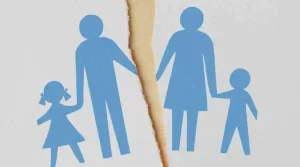Most people are aware of the five phases of grieving. Many people identify these phases only with the loss of a loved one. However, individuals have several methods to mourn and express their sorrow. Divorce is, in some ways, a death. It’s the end of a relationship. It’s the end of your life’s vision. Let’s call it divorce sorrow.
As a result, it’s not surprising that you’re going through the standard five stages of grieving as you digest the profound shift. Understanding these phases is critical to navigating through them.
DENIAL OR EVERYTHING IS FINE
The marriage is in peril. One or both partners are aware of this. However, they will not act on this information. Instead, they will pretend that everything is OK or expect the issues to disappear independently.
Denial may also appear in various ways. If the divorce request is unexpected, they may refuse to acknowledge that the marriage is finished. Divorce is a major adjustment, and the loss of normality may be particularly traumatic.
Because denial can impact court proceedings, you must surround yourself with friends, family, and the right family law attorney during this stage.
ANGER OR EVERYTHING IS THEIR FAULT
After denial comes anger, which can be especially volatile in a divorce.
Everything is fair game at this point. Couples will begin an autopsy on their relationship to see where it went wrong and use their findings against one another. It is not necessarily logical or right, and it may be harmful.
Anger, although often directed at another else, may also be directed against oneself. If children are involved, the parent pursuing the divorce may feel angry and guilty about separating the family. They may also be upset with themselves for not trying harder or giving up.
Anger is a strong emotion but frequently intense in situations like these—a response to the abrupt change in your life.
BARGAINING, OR MAYBE I OVERREACTED
Couples may evaluate what went wrong in their relationship after their anger has subsided if the situations that prompted them to contemplate divorce were as horrible as they claimed. Is it possible to do things differently? Is it possible to make amends?
During this period, spouses may find themselves making well-intentioned but unrealistic promises. It’s the first time they think about life once they’re no longer together.
DEPRESSION, OR WHAT HAVE I DONE?
Even if you know divorce is the best option for you, it will not be easy. Human emotions are complicated and sometimes contradicting. Whatever way you look at it, a significant portion of your life has ended. Even relief may be bittersweet or tinged with melancholy.
There is also a lot of personal and social pressure to stay calm throughout the divorce process. The tension of attempting to retain composure may sometimes be tough to manage. Helplessness, loss, and feeling overwhelmed are all extremely prevalent.
Ensure you have a strong support structure to assist you through the plethora of contradictory emotions likely to arise while your divorce is completed.
ACCEPTANCE OR I DID THE RIGHT THING
It may take some time, but the light at the end of the tunnel will ultimately replace the tunnel itself. The life you construct after your divorce will seem familiar rather than exotic. You will adjust to life without your ex-partner. You will think more clearly and know exactly what you want to achieve in all critical areas—personal, professional, and financial.
DIVORCE GRIEF
These stages, like sorrow, are not usually experienced sequentially, and development is not necessarily linear. Volleying between locations is quite prevalent. Expect your emotional state to be messy, disorganized, and illogical. Rely on your support network, which includes your divorce attorney. You’ll get there in the end.
If you are thinking about divorce, contact the Paducah Family Law Offices. We will assist you while you adjust to your new normal.


